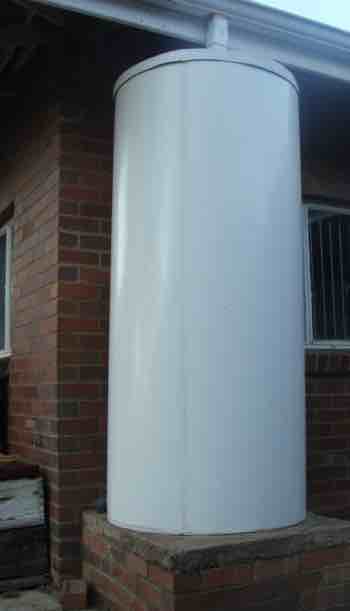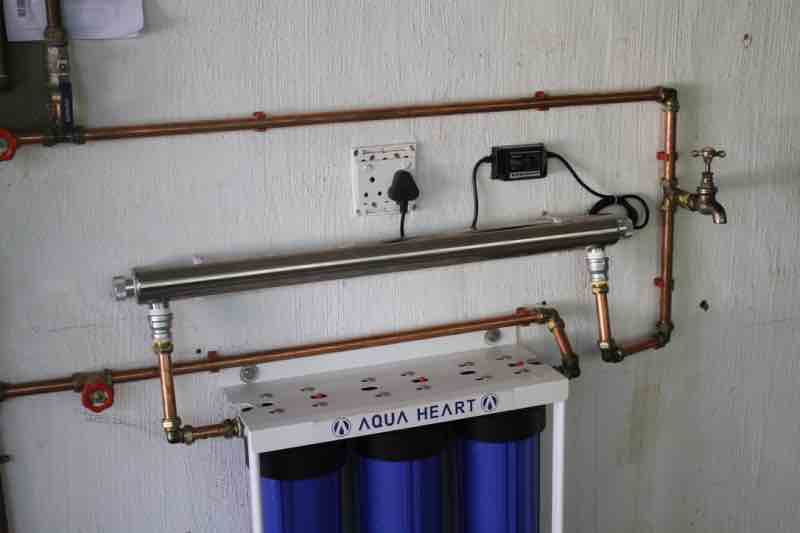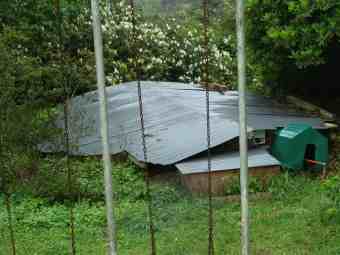How safe is our drinking water?
How safe is our drinking water is a profoundly important yet controversial and difficult topic; whilst chlorine can remove the bugs it also introduces toxic THMs if there is any organic matter. What are they?
The only other option is to harvest and store the rain in tanks for drinking; or use bottled-water which comes with risks of its own.
Reverse-osmosis has some benefits but then you lose out on important minerals; the big plus is that all plastic particles and other toxic chemicals are also removed. Our strong recommendation is harvesting rainwater for drinking; the household in general and for irrigation of our gardens too.

This page was last updated on 9th January, 2024.
So just how safe is our drinking-water?
Chlorination is arguably one of the greatest breakthroughs ever in public wellness. Cholera and typhoid deaths have virtually been eliminated in the developed-world; and other waterborne diseases too.
Chlorine has another great benefit over other means of disinfecting public drinking-water; there is a residual effect that continues in the reticulation. That helps to destroy bacterial pathogens that may enter the conduits.
"Nothing has changed for Temba and Hammanskraal residents. When they open their taps all they get is slimy, smelly undrinkable water."
- Times Live, 5th January, 2023.
Yet still today over three-million young children die every year in the developing world from waterborne bugs where proper reticulation, management of sewerage and sanitisation do not exist.
Bacteria in the rain are not the problem; the villains come from free-flowing sewage that finds its way into streams, dams and eventually our drinking water if it is not properly treated.
Drinking from a suburban rainwater tank like that above should not be assumed to be safe. Bacteria and other pathogens will flourish in the higher ambient temperature.
"Research conducted by the Water Research Commission found that consistent load-shedding or power outages do have an effect on supply and quality."
There is a new realisation that the friendly bacteria in the gut play an extremely important role in the prevention of non-communicable diseases. Questions are being asked whether this residual influence of chlorine may have a significant antibiotic effect on the microbiomes that dwell in the gastrointestinal tracts of humans.
Post-chlorination studies invite many alarming questions.
Numerous animal studies suggest that water is safe to drink at the level of chlorine used in our reticulation; remember the stomach has large amounts of the acid anyway. However there is still no research to date that evaluates any possible toxic effect of that residual chemical on the normal-floras that inhabit the intestines of humans .
Of greater concern though is the effect of chlorine in our water-reticulation on organic material forming toxic trihalomethanes (THMs) that cause malignant bladder tumours and other problems like miscarriages.
You may have read in the media that Cape Town’s water has an earthy look and taste[1]; it is due to high levels of organic material from the Voëlvlei-Dam. Despite assurances from the authorities that it is safe to drink, residents are rightly concerned.
These findings plus the large number of plastic particles found in our drinking-water create great difficulties for those concerned about their wellness. Are we becoming neurotic? Are we on the verge of what is known as orthorexia?
That is a pathological worry about right-eating and the fluids we consume; a first cousin to better known anorexia.
Or is it time to wean off plastic considering the extreme danger it causes to all forms of life including humans?
For me it is just one more reason why we are so pleased to have built an underground reservoir which stores the rainwater we have harvested from the roof; that may have some organic-material from the gutters but in the absence of chlorine, no THMs are formed. We have a happier microbiome and there is the certainty of little or no plastic being ingested.
Eighty percent of a group of healthy individuals were recently found to have plastic attached to immunoglobulins in their blood[5].
There is little or no risk of waterborne bacteria like
E.Coli, or even amoeba from fecal material but it would be safer to
boil it if one intends to drink from the rain; we sterilise it with a UV-lamp.

Of course since the beginning of time, humans have been drinking the rain. Yet water scarcity in the world is becoming a major factor in political stability; a large new dam in Ethiopia is threatening peace in East Africa.
superbugs
Pharmaceuticals in our water, both residues passed in the urine and effluent from the companies that manufacture medication are being fingered for breeding drug-resistant bacteria and fungal infections.
In India effluent from pharmaceutical factories is discharged into the River Musi; the water is essential for irrigating the paddies. Women transplanting rice seedlings into the flooded fields are suffering from serious infections on their arms and legs that will not respond to anti-fungal medication[4].
Just how safe is our drinking water? Sewage treatment plants cannot remove these chemicals.
Mercury
Confirmed reports in the media about beads of mercury being found in tap-water in Soweto, South Africa are extremely worrying. The metal is highly toxic.
Non-nutritive sweeteners
Non-nutritive sweeteners are passed unchanged into the urine; they are frequently being found even in boreholes, groundwater and sewage treatment plants.
Researchers have already shown that toxic sweeteners are causing urinary bladder tumours and glucose-intolerance leading to diabetes.
In addition researchers have now shown that they increase the transfer of antibiotic-resistant genes between the bacteria in our guts[2]. Already nearly a million people worldwide die annually from these bugs for which there is no known treatment; and it is estimated to rise more than ten times in the next 30 years.
In addition researchers writing in the Journal of the American Heart Association[3] report a greater incidence of stroke, and three-times increased likelihood of suffering eventually from dementia if you have just one diet soda per day; sweetener residues in our water simply add to the problem.
Just how safe is our drinking water?
Perfluoroalkyl substances (PFAS)
Perfluoroalkyl substances are to be found in almost all municipal and even underground water supplies. They are noxious chemicals used in the manufacture of a host of fabrics that are commonly used in carpets, clothing and food-wrappers; nonstick cookware, pizza boxes and makeup too.
They have hormone-like structures and play havoc with many bodily systems affecting our immune wellness, raising cholesterol and causing obesity for example. Known as "forever chemicals" these man made compounds pose a greater danger to health than previously thought[6]. Moreover only reverse osmosis and two stage activated carbon filters in the home remove them[7].
Harvesting the rain is one simple way of reducing our exposure to them; then we have fewer concerns about the safety of our drinking water.
Meth
When we drink a glass of water from the tap we have little idea of what else is dissolved in it.
Czech scientists have found that levels of meth are really quite high; they have been testing how brown trout respond to the levels of drug-addled water found in many riverine systems. The fish love it apparently.
Do drugs also find their way into our reticulation? Just how safe is our drinking water?
Warm water
Bacteria flourish in warm water; that from above-ground tanks definitely should not be considered safe to drink without sterilisation.
Rainwater storage should remain our focus; it is much colder below ground.
Our harvesting model focuses on the nuts and bolts of building an underground reservoir at each home as has been done in the Netherlands for centuries; the Dutch are the acclaimed masters since 60pc of Holland is below sea-level.
Yet hot water in the home is not negotiable for baths and showers. Depending on how close to boiling it gets it may also not be safe to drink.
How safe is our drinking water? Nowhere near what we think; is it time to start harvesting the rain falling on your roof?
Agricultural runoff
Contamination of the water supply in Brazil with dangerous chemicals, in particular glyphosate is being fingered as the cause of a rapid increase in childhood leukaemias. The production of soybeans in the last fifteen years has risen dramatically making the South American country the world's leading consumer of highly hazardous pesticides.
Researchers publishing in PNAS state the exposure to these toxic substances is occurring through the water supply[8]. They state that their findings represent only "the tip of the iceberg" for substantial health issues from high-input crop production.
How safe is our drinking water? Really we have no idea unless extensive testing is done; which is unlikely in most parts of the world.
"We show a strong and persistent relationship between the arrival of high-intensity agriculture in a region and adverse human health outcomes."
- PNAS, October, 2023
How safe is our drinking water?

How safe is our drinking water is a question we should all be asking.
Many people do not drink any water these days in the Western world and that is part of the vexing question. On the other hand the added sugar and artificial sweeteners are possibly even more dangerous for our well-being than the other toxic chemicals.
- Cape Town's earthy-tasting water is safe to drink, says city.
- Non-nutritive sweeteners can promote the dissemination of antibiotic resistance through conjugative gene transfer. Web: https://www.nature.com/articles/s41396-021-00909-x#Sec18
- Artificially Sweetened Beverages and Stroke, Coronary Heart Disease and All-Cause Mortality. Web: https://www.ahajournals.org/doi/10.1161/STROKEAHA.118.023100
- Could the next big outbreak be lurking in the water? Pharma pollution blamed for breeding superbugs.
- Plastic particle pollution in human blood
- EPA warns toxic "forever chemicals" more dangerous than once thought
- Not All In-Home Drinking Water Filters Completely Remove Toxic PFAS
- Agricultural intensification and childhood cancer in Brazil
When browsing use right click and "Open Link in New Tab" or you may get a bad gateway signal.
Newsletter
Our newsletter is entitled "create a cyan zone" at your home, preserving both yourself and Mother Earth for future generations; and the family too, of course. We promise not to spam you with daily emails promoting various products. You may get an occasional nudge to buy one of my books.
Here are the back issues.
- Lifestyle and ideal body weight
- What are ultra-processed foods?
- Investing in long-term health
- Diseases from plastic exposure
- Intensive lifestyle management for obesity has limited value
- A world largely devoid of Parkinson's Disease
- The impact of friendly bacteria in the tum on the prevention of cancer
- There's a hole in the bucket
- Everyone is talking about weight loss drugs
- Pull the sweet tooth
- If you suffer from heartburn plant a susu
- Refined maize meal and stunting
- Should agriculture and industry get priority for water and electricity?
- Nature is calling
- Mill your own flour
- Bake your own sourdough bread
- Microplastics from our water
- Alternative types of water storage
- Wear your clothes out
- Comfort foods
- Create a bee-friendly environment
- Go to bed slightly hungry
- Keep bees
- Blue zone folk are religious
- Reduce plastic waste
- Family is important
- What can go in compost?
- Grow broad beans for longevity
- Harvest and store sunshine
- Blue zone exercise
- Harvest and store your rainwater
- Create a cyan zone at your home
Did you find this page interesting? How about forwarding it to a friendly book or food junkie? Better still, a social media tick would help.
Address:
56 Groenekloof Rd,
Hilton, KZN
South Africa
Website:
https://www.bernard-preston.com